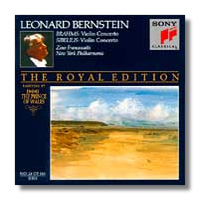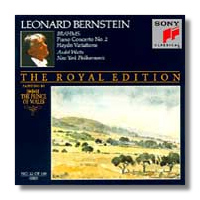
The Internet's Premier Classical Music Source
Related Links
- Brahms Reviews
- Latest Reviews
- More Reviews
-
By Composer
-
Collections
DVD & Blu-ray
Books
Concert Reviews
Articles/Interviews
Software
Audio
Search Amazon
Recommended Links
Site News
 CD Review
CD Review
Johannes Brahms

Concertos
- Violin Concerto
- Jean Sibelius: Violin Concerto
Zino Francescatti, violin
New York Philharmonic Orchestra/Leonard Bernstein
Sony SK47540 67min


- Piano Concerto #2
- Haydn Variations
André Watts, piano
New York Philharmonic Orchestra/Leonard Bernstein
Sony SK47539 70min
Zino Francescatti's name may sound Italian, but he was French to the core. Born and educated there, he was a prodigy who gave his first concerts at age 10. For a time he earned his living as an orchestral musician, but his solo career was given a considerable boost when he toured England with Ravel in the '20s. Francescatti made his American debut in 1939 and eventually settled in New York City. His sonata recordings with Robert Casadesus, especially their magnificent cycle of the Beethoven Sonatas, are perhaps his most enduring legacy.
In his painstaking study of violin-playing, Great Masters of the Violin, Boris Schwarz had great praise for this recording of the Brahms concerto: "[It] may lack the ultimate incisiveness, but it is more than made up by noble grandeur and lyricism." Truly, this is a lyrical performance, but I find Francescatti's thinness of tone, overuse (and misuse) of portamento, and generally undramatic approach far too reflective and self-effacing. Francescatti is most effective in III, where his coyness and wit are quite compelling. Bernstein's accompaniment is perfectly matched to the violinist's phrasing and gentleness of approach, and Harold Gomberg's oboe solo in II is deliciously lovely. Still, I prefer the hair-raising drama and the full-bodied tone which Henryk Szeryng brought to this concerto – a recording that is also notable for the endlessly inventive accompaniment of Pierre Monteux.
Whatever reservations I may have about Francescatti's Brahms, I cannot recommend his Sibelius highly enough. The soloist tosses off the score's manifold technical difficulties with almost embarrassing ease. While his interpretation burns with a slightly lower flame than either Perlman or Szeryng, Francescatti captures all of the mystery, wonder, and heroism inherent in the work. Another factor sets this apart from other concerto recordings – for once orchestra and soloist are given nearly equal footing, and Bernstein makes the most of it. Bernstein was, after all, one of our greatest Sibelians, and this may well be his best recording of this composer's music. His accompaniment – while always colorful and brilliant – nevertheless manages to mirror the character of Francescatti's playing at every turn.
Sound is fine for its age. While I can detect no tape hiss, there is a soft background noise that may result from some kind of air circulation system.
With a few notable exceptions (the coda of II or the lovely and haunting III) Bernstein and André Watts's recording of the second Brahms Piano Concerto is hopelessly earthbound. Watts in particular is dull, mechanical, and incredibly cautious. For a satisfactory version, look instead to Fleisher/Szell, a taut and dynamic performance that explodes with drama and poetry – a recording which should bury forever the myth that George Szell lacked emotion.
Bernstein's Haydn Variations are beautifully played by the orchestra, but, strangely, the interpretation lacks the fire and organic unity that Bruno Walter brought to his New York Philharmonic recording.
Copyright © 1995, Thomas Godell.
This review originally appeared in the American Record Guide




















